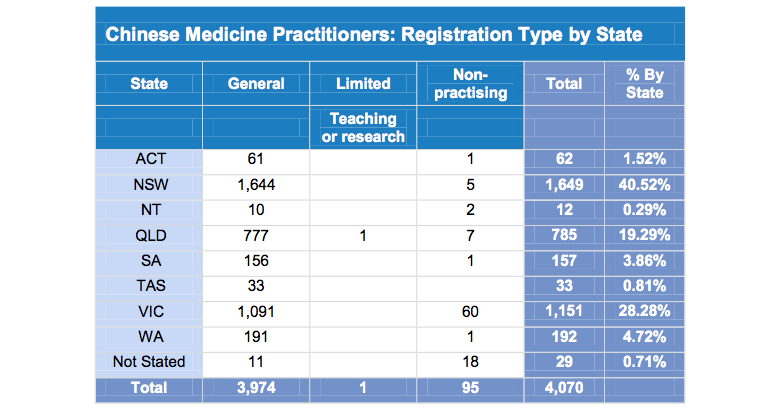By Maddison Johnstone - [email protected]
The federal government's decision to register Chinese medical practitioners has seen 785 registrations in Queensland since July 2012.
The statistics, updated in June 2013, show Queensland practitioners made up 19.29% of total registrations.
The federal government's decision to register Chinese medical practitioners has seen 785 registrations in Queensland since July 2012.
The statistics, updated in June 2013, show Queensland practitioners made up 19.29% of total registrations.
Statistics released by the Chinese Medicine Board of Australia
Royal Melbourne Institute of Technology lecturer Dr Zhen Zheng said the public had eased resistance to the techniques as a result of the compulsory registration.
"The national registration means every practitioner should have a high standard in their practice, and people are more comfortable with them as a result,” she said.
"People need to be patient and give support to medicine like Chinese medicine, if people are really serious about science and about healthcare for Australia.
"I encourage people who are interested in science, to actually read all this evidence before jumpng to conclusions."
Dr Zheng conceded that herbal medicine could be a problem in Australia.
"Herbal medicine can be a big problem, because the TGA [Therapeutic Goods Association] have a registered list of medications," she said.
"Products that are registered with TGA mean that their safety and efficacy have been tested; whereas those listed with TGA means their safety (not efficacy) has been tested."
"The national registration means every practitioner should have a high standard in their practice, and people are more comfortable with them as a result,” she said.
"People need to be patient and give support to medicine like Chinese medicine, if people are really serious about science and about healthcare for Australia.
"I encourage people who are interested in science, to actually read all this evidence before jumpng to conclusions."
Dr Zheng conceded that herbal medicine could be a problem in Australia.
"Herbal medicine can be a big problem, because the TGA [Therapeutic Goods Association] have a registered list of medications," she said.
"Products that are registered with TGA mean that their safety and efficacy have been tested; whereas those listed with TGA means their safety (not efficacy) has been tested."
Currumbin Chinese Medicine owner and practitioner of 26 years Wally Simpson said the registration was a "double-edged sword".
"It protects our title so you can't claim to be an acupuncturist or a Chinese herbalist but that doesn't stop people form practising it or advertising it," he said.
"If you see a Chinese practitioner, make sure they are actually registered to do that, or belong to a national association such as AACMA [Australian Acupuncture and Chinese Medicine Association].
"That way you know you're getting someone who has actually done a lot of study, rather than someone who has done a dry needling course that does not have any requirements and consists of one weekend."
Listen to Mr Simpson discuss some of the most common medicines and techniques (pictures below).
"It protects our title so you can't claim to be an acupuncturist or a Chinese herbalist but that doesn't stop people form practising it or advertising it," he said.
"If you see a Chinese practitioner, make sure they are actually registered to do that, or belong to a national association such as AACMA [Australian Acupuncture and Chinese Medicine Association].
"That way you know you're getting someone who has actually done a lot of study, rather than someone who has done a dry needling course that does not have any requirements and consists of one weekend."
Listen to Mr Simpson discuss some of the most common medicines and techniques (pictures below).
University of Technology Sydney lecturer Congxing Yang said Chinese medicine offered many health benefits that Western practices did not.
"There are certain health issues that we know very well Western medicine cannot help the patient, because they don’t have the answer," he said.
"Western medicine probably is beneficial for treating acute conditions whereas Chinese medicine is probably better dealing with chronic conditions.”
Mr Yang agreed with Dr Zheng that the national registration had eased public concern.
"If you’re talking about now, especially after the national registration, I don’t think they are as resistant as they used to be,” he said.
"There are certain health issues that we know very well Western medicine cannot help the patient, because they don’t have the answer," he said.
"Western medicine probably is beneficial for treating acute conditions whereas Chinese medicine is probably better dealing with chronic conditions.”
Mr Yang agreed with Dr Zheng that the national registration had eased public concern.
"If you’re talking about now, especially after the national registration, I don’t think they are as resistant as they used to be,” he said.
View the Slideshow of common techniques and medicines discussed with Wally Simpson.

 RSS Feed
RSS Feed